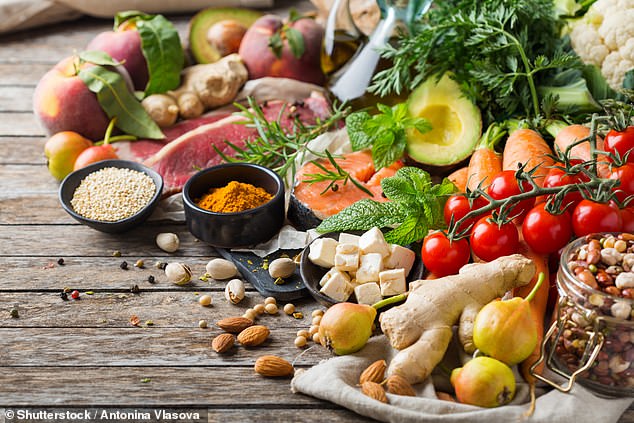[ad_1]
Scientists have confirmed that the best defence against bowel cancer is served up on a plate—literally.
A new study looked at the dietary habits of 143,434 Britons, and found that people who followed a ‘healthy’ plant-based diet were less likely to develop inflammatory bowel diseases which can lead to cancer.
During an average follow-up of 14.5 years, the researchers found that 1,117 participants developed inflammatory bowel disease, 795 cases of ulcerative colitis and 322 cases of Crohn’s disease.
Between 2006 and 2010, the study recruited participants aged 40 to 69 who live in multiple locations across England, Scotland and Wales, and asked them to fill in diaries of what they had eaten and drank in the last 24 hours.
The types of food and drink were categorised as ‘healthy plant foods, unhealthy plant foods or animal foods’.
From this data, researchers were able to establish that a healthy plant-based diet was associated with an 8% lower risk of ulcerative colitis, and a 14% lower risk of Crohn’s disease.
However, it isn’t as simple as just cutting out meat.
An unhealthy plant-based diet (which includes dairy and eggs) was associated with a 15% higher risk of Crohn’s disease, with results suggesting that this was in part due to higher intake of vegetable oils and animal fats.

A study has revealed a healthy plant-based diet can stave off IBD and deadly bowel cancer
The research, published in Molecular Nutrition and Food Research, concluded that diets rich in fruits and vegetables are protective factors against inflammatory bowel disease, likely due to their anti-inflammatory properties.
Lead author of the study, Dr Zhe Shen, MD an associate professor at Zhejiang University, in China, said: ‘Our research indicates that a healthy plant-based diet may protect against inflammatory bowel disease.’
Ulcerative colitis and Crohn’s disease are both types of inflammatory bowel disease which affect over half a million Britons and more than two million Americans.
Nearly a third of people diagnosed with IBD will go on to develop deadly bowel cancer within 10 years.
This is because the irritation of the lining of the bowel can cause abnormal, pre-cancerous cells to form there, according to Cancer Research UK.
Inflammation of the gut is what causes the often-debilitating symptoms of both Crohn’s disease and ulcerative colitis.
Crohn’s disease causes inflammation of the digestive tract which can cause diarrhoea, blood in your poo, stomach pains, and fatigue.
According to the NHS, in children, not growing as expected or delayed puberty are also potential signs of the disease.
These symptoms can be mild or severe and usually come and go over time in flare-ups or remissions.
Meanwhile, ulcerative colitis, which has similar symptoms, causes inflammation and ulcers in the lining of the large intestine (colon) and rectum—the lower part of the large intestine.
Another study suggested going vegan lowers the risk of colorectal cancer in men by more than a fifth.
It comes amid an alarming explosion of cancers in young people, which has baffled experts.
Over the last 30 years, young diagnoses of colon cancer have shot up by 80 per cent across the globe, research suggests.
Meanwhile, rates of the disease in older groups, who are statistically more likely to get the disease overall, have either declined or remained stable to the same period.
Concerningly, last year experts predicted that deaths from bowel cancer are set to soar by a tenth by 2040.
There have been several different explanations proposed by experts for the explosion in cases in young people.
Earlier this year a bombshell study found a common food bug E. coli picked up in childhood may be fuelling the epidemic.
Other researchers have suggested it could be due to ‘accelerated aging’ which increases their risk of developing polyps, small growths that can lead to cancer.
This aging is thought to be caused by a mixture of lifestyle choices, such as diet and level of exercise.
However, it has also been suggested that factors typically outside of an individual’s control could be to blame, like chemicals in food, clothing and air.
Some studies have pointed to seed oils like sunflower, canola, corn and grapeseed, as the explanation.
Meanwhile, a growing number of studies have laid the blame at the foot of ultra-processed foods (UPFs).
Other theories suggest microplastics—particles of plastic that are transferred on to food from packaging materials—and additives in store-bought foods.
[ad_2]
This article was originally published by a www.dailymail.co.uk . Read the Original article here. .

